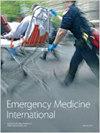Evaluation of CD4+ T Lymphocyte Counts to Predict Survival of ICU Patients with Sepsis Using Sepsis-3 Criteria: A Prospective Cohort Study.
IF 0.8
4区 医学
Q3 EMERGENCY MEDICINE
引用次数: 0
Abstract
Background Sepsis remains a major health condition with a high mortality rate that may be related to immunosuppression. T lymphocyte subsets may reflect the immune function of sepsis patients. The purpose of this study was to investigate the predictive value of CD4+ T lymphocyte counts of ICU patients for their short-term prognosis. Methods We conducted a prospective, observational cohort study in a general ICU and enrolled patients with sepsis using the Sepsis-3 criteria. Peripheral blood samples were collected within 24 hours of enrollment or measurement of blood cell analysis and biomarkers of CD4+ T lymphocytes and CD8+ T lymphocytes. Severity was classified by the Acute Physiology and Chronic Health Evaluation II and Sequential Organ Failure Assessment (SOFA) scores. The primary outcome was 28-day mortality. Results A total of 100 patients with sepsis were enrolled and analyzed. CD4+ T lymphocyte counts gradually decreased based on 28-day mortality (p < 0.001). Similarly, multivariate logistic regression analysis showed that only CD4+ T lymphocyte counts were an independent predictor of 28-day mortality in sepsis patients. The area under the receiver operating characteristic curve of the combination of CD4+ T lymphocyte counts and the SOFA score was 0.78. Conclusion Our study demonstrated that CD4+ T lymphocyte counts are associated with 28-day mortality. A combination of CD4+ T lymphocyte counts with the SOFA score increased the predictive accuracy for 28-day mortality.使用败血症-3 标准评估 CD4+ T 淋巴细胞计数以预测 ICU 败血症患者的存活率:一项前瞻性队列研究
背景败血症仍然是一种主要的健康问题,死亡率很高,这可能与免疫抑制有关。T 淋巴细胞亚群可反映败血症患者的免疫功能。本研究的目的是探讨重症监护病房患者的 CD4+ T 淋巴细胞计数对其短期预后的预测价值。在入组或测量血细胞分析以及 CD4+ T 淋巴细胞和 CD8+ T 淋巴细胞生物标志物的 24 小时内采集外周血样本。严重程度根据急性生理学与慢性健康评估 II 和序贯器官衰竭评估 (SOFA) 评分进行分类。主要结果是 28 天的死亡率。根据 28 天的死亡率,CD4+ T 淋巴细胞计数逐渐下降(p < 0.001)。同样,多变量逻辑回归分析显示,只有 CD4+ T 淋巴细胞计数是脓毒症患者 28 天死亡率的独立预测因子。CD4+ T 淋巴细胞计数和 SOFA 评分组合的接收器操作特征曲线下面积为 0.78。将 CD4+ T 淋巴细胞计数与 SOFA 评分相结合可提高 28 天死亡率的预测准确性。
本文章由计算机程序翻译,如有差异,请以英文原文为准。
求助全文
约1分钟内获得全文
求助全文
来源期刊

Emergency Medicine International
EMERGENCY MEDICINE-
CiteScore
0.10
自引率
0.00%
发文量
187
审稿时长
17 weeks
期刊介绍:
Emergency Medicine International is a peer-reviewed, Open Access journal that provides a forum for doctors, nurses, paramedics and ambulance staff. The journal publishes original research articles, review articles, and clinical studies related to prehospital care, disaster preparedness and response, acute medical and paediatric emergencies, critical care, sports medicine, wound care, and toxicology.
 求助内容:
求助内容: 应助结果提醒方式:
应助结果提醒方式:


